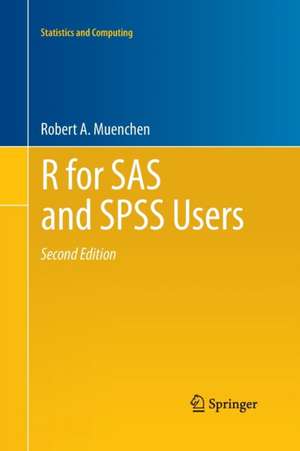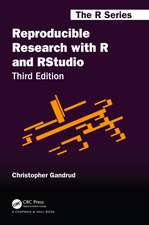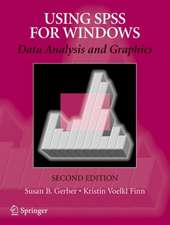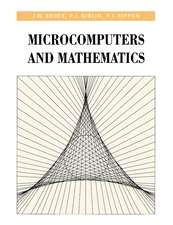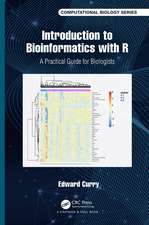R for SAS and SPSS Users: Statistics and Computing
Autor Robert A. Muenchenen Limba Engleză Paperback – 23 aug 2016
The glossary defines over 50 R terms using SAS/SPSS jargon and again using R jargon. The table of contents and the index allow you to find equivalent R functions by looking up both SAS statements and SPSS commands. When finished, you will be able to import data, manage and transform it, create publication quality graphics, and perform basic statistical analyses.
This new edition has updated programming, an expanded index, and even more statistical methods covered in over 25 new sections.
| Toate formatele și edițiile | Preț | Express |
|---|---|---|
| Paperback (1) | 746.41 lei 43-57 zile | |
| Springer – 23 aug 2016 | 746.41 lei 43-57 zile | |
| Hardback (1) | 426.73 lei 22-36 zile | +70.00 lei 6-12 zile |
| Springer – 26 iul 2011 | 426.73 lei 22-36 zile | +70.00 lei 6-12 zile |
Din seria Statistics and Computing
- 20%
 Preț: 753.99 lei
Preț: 753.99 lei -
 Preț: 228.21 lei
Preț: 228.21 lei - 20%
 Preț: 505.20 lei
Preț: 505.20 lei -
 Preț: 438.82 lei
Preț: 438.82 lei -
 Preț: 386.81 lei
Preț: 386.81 lei - 20%
 Preț: 1059.77 lei
Preț: 1059.77 lei -
 Preț: 426.73 lei
Preț: 426.73 lei - 20%
 Preț: 474.37 lei
Preț: 474.37 lei - 18%
 Preț: 1387.07 lei
Preț: 1387.07 lei -
 Preț: 433.53 lei
Preț: 433.53 lei -
 Preț: 208.58 lei
Preț: 208.58 lei - 20%
 Preț: 1174.26 lei
Preț: 1174.26 lei - 18%
 Preț: 959.32 lei
Preț: 959.32 lei - 15%
 Preț: 643.48 lei
Preț: 643.48 lei -
 Preț: 392.75 lei
Preț: 392.75 lei -
 Preț: 404.29 lei
Preț: 404.29 lei - 15%
 Preț: 640.06 lei
Preț: 640.06 lei - 20%
 Preț: 1454.73 lei
Preț: 1454.73 lei -
 Preț: 377.18 lei
Preț: 377.18 lei - 23%
 Preț: 652.31 lei
Preț: 652.31 lei - 15%
 Preț: 710.42 lei
Preț: 710.42 lei - 15%
 Preț: 695.85 lei
Preț: 695.85 lei - 20%
 Preț: 1276.86 lei
Preț: 1276.86 lei - 18%
 Preț: 1003.38 lei
Preț: 1003.38 lei - 15%
 Preț: 703.85 lei
Preț: 703.85 lei -
 Preț: 384.70 lei
Preț: 384.70 lei - 15%
 Preț: 606.17 lei
Preț: 606.17 lei - 15%
 Preț: 646.94 lei
Preț: 646.94 lei - 15%
 Preț: 589.02 lei
Preț: 589.02 lei - 18%
 Preț: 1117.99 lei
Preț: 1117.99 lei -
 Preț: 503.52 lei
Preț: 503.52 lei - 18%
 Preț: 735.38 lei
Preț: 735.38 lei - 15%
 Preț: 693.90 lei
Preț: 693.90 lei
Preț: 746.41 lei
Preț vechi: 910.26 lei
-18% Nou
142.87€ • 155.24$ • 120.09£
Carte tipărită la comandă
Livrare economică 21 aprilie-05 mai
Specificații
ISBN-10: 1493939262
Pagini: 716
Ilustrații: XXVIII, 686 p.
Dimensiuni: 155 x 235 x 36 mm
Greutate: 0.98 kg
Ediția:Softcover reprint of the original 2nd ed. 2011
Editura: Springer
Colecția Springer
Seria Statistics and Computing
Locul publicării:New York, NY, United States
Cuprins
Recenzii
“This is a greatly expanded second edition of a text that has already proved widely popular. The explanation is careful and detailed. It uses SAS and SPSS terminology, matching it with R terminology … . A glossary translates R terminology into terminology that is likely to be more familiar to SAS and SPSS users. … a wide-ranging and carefully compiled source of information on R. It is a strongly recommended addition to the library of anyone who comes to R from SAS or SPSS.” (John H. Maindonald, International Statistical Review, Vol. 80 (1), 2012)
Notă biografică
Textul de pe ultima copertă
The glossary defines R terms using SAS/SPSS terminology and again using R terminology. The table of contents and the index allow you to find equivalent R functions by looking up both SAS statements and SPSS commands. The second edition adds 216 pages of new topics.
"I found the book extremely helpful…The material is laid out in a way that makes it very accessible. Because of this I recommend this book to any R user regardless of his or her familiarity with SAS or SPSS...For new R users it will demystify many aspects, and for existing R users it will have many answers to those questions you have been too afraid to ask in public."
--The American Statistician
"… an excellent introduction to R…the book meticulously covers data management, data structures, programming, graphics and basic statistical analysis in R. The prose is clear, the examples tied to their SPSS and SAS analogs. The handling of both traditional and newer “ggplot2” graphics is comprehensive: SPSS and SAS users will undoubtedly find lots to like. "
--Information Management
"As a long time SAS user this book makes the task of transition to R much more palatable and appealing. It also greatly reduces the time to get up andrunning in R effectively."
--Technometrics
“It is great to see this book in a second edition. It serves nicely as an introduction to R, irrespective of whether they are familiar with SAS or SPSS. I have long been a fan of programming by example and the book is full of excellent ones.”
--Graham Williams, Author, Data Mining with Rattle and R: The Art of Excavating Data for Knowledge Discovery
Caracteristici
Descriere
R is a powerful and free software system for data analysis and graphics, with over 5,000 add-on packages available. This book introduces R using SAS and SPSS terms with which you are already familiar. It demonstrates which of the add-on packages are most like SAS and SPSS and compares them to R's built-in functions. It steps through over 30 programs written in all three packages, comparing and contrasting the packages' differing approaches. The programs and practice datasets are available for download.
The glossary defines over 50 R terms using SAS/SPSS jargon and again using R jargon. The table of contents and the index allow you to find equivalent R functions by looking up both SAS statements and SPSS commands. When finished, you will be able to import data, manage and transform it, create publication quality graphics, and perform basic statistical analyses.
This new edition has updated programming, an expanded index, and even more statistical methods covered in over 25 new sections.
